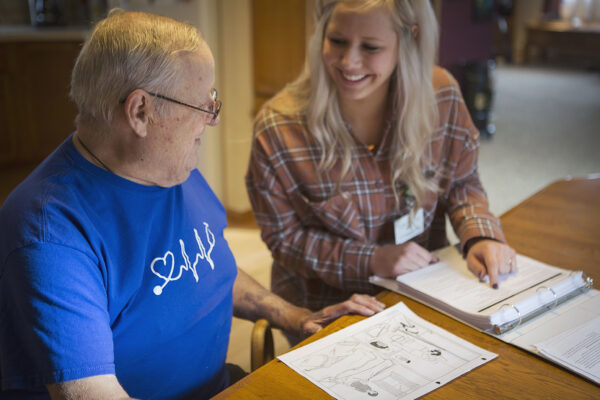A Home Safety Checklist for Older Adults
Oct. 21, 2022
By Danielle Andersen

How to prevent accidents and injuries at home
Many older adults want to age in a place that feels like home. However, an everyday mishap, such as tripping over a cord or slipping on an icy driveway, could turn into a serious injury, a hospital stay, or worse.
More than one in three people over 65 fall each year, according to the National Institute on Aging. In 2019 alone, falls were the leading cause of injury-related deaths for that age group, a number which has been steadily rising since 2009.
Winter conditions in Minnesota can make older adults especially susceptible to accidents. According to the CDC, the state had one of the highest mortality rates for elder falls, about 88 to 105 per 100,000, in 2016.
To keep your loved one protected, here are 5 home safety tips you can add to your checklist to prevent falls and other accidents at home.
1. Run through a home safety checklist
To reduce the risk of falls at home, the age-care experts at Knute Nelson recommend minimizing tripping hazards, such as removing clutter and cords from floors and using nonslip mats under rugs.
For additional safety measures, you can add handrails and grab bars to staircases and improve lighting. Some studies estimate that 30% to 50% of falls are due to factors like poor lighting and uneven surfaces.
In places like the kitchen and closets, it’s important to keep items accessible and easy to reach. Avoid putting items on high shelves requiring a chair or a ladder to get to them.
Older adults may also need assistance with household tasks, such as cooking and cleaning. Knute Nelson’s Home Health Care team helps with household tasks and provides companionship to support aging at home.
2. Stay on top of medications
A health tracking poll in 2019 found 89% of adults 65 and older take prescription drugs and more than half reported taking four or more medications.
Juggling prescriptions can be challenging and certain medications can increase the risk of falls for different reasons, including side effects like dizziness.
Taking the right medication at the right time is a point the home health care team at Knute Nelson emphasizes to prevent emergencies. At home, they can help manage medications for older adults or educate family caregivers.
3. Manage chronic diseases
Some conditions, such as diabetes, heart disease, and thyroid problems, can impact balance and increase the risk of falls. Eyesight, hearing, and reflexes can also weaken with age, making some older adults more vulnerable to accidents.
Staying on top of chronic diseases and monitoring blood pressure and other vitals through skilled nursing is an important way Knute Nelson helps older adults remain safe at home.
Having blood pressure that drops too rapidly when one sits up, for example, can cause dizziness. Being aware and staying vigilant of these conditions can help prevent an injury.
4. Work on improving strength and balance
Muscle weakness and balance problems are often linked to falling. Knute Nelson’s Home Health Care team offers physical therapy and occupational therapy, among other options to build strength and support safety at home.
Physical therapy focuses on improving lower body muscles for walking and other movements, while occupational therapy addresses the upper body for making everyday activities easier.
However, another surprising risk is wearing unsafe or uncomfortable footwear, such as high heels or backless shoes. Getting rid of old shoes lying around closets and doorways can also reduce clutter and remove tripping hazards.
5. Have an emergency call pendant
Personal Emergency Response Systems (PERS) make it easier for older adults to maintain their independence and stay at home safely.
Knute Nelson uses home-based technology to empower older adults. They offer personal emergency response pendants, remote health monitoring, and medication management devices.
This technology offers another layer of protection and peace of mind with tools to help monitor conditions, send reminders, and help if a fall or in-home emergency happens.
Even with these remote services, help and compassionate support are close by when you or your loved one needs it.
Is it time to get additional help?
If you are unsure whether home health care services might be the right choice for you or a loved one, our short assessment can help assess your situation and give you personalized results in about 5 minutes. For additional questions or to speak with a home health care professional, connect with our team at (320)335-8753 or fill out an inquiry form.

